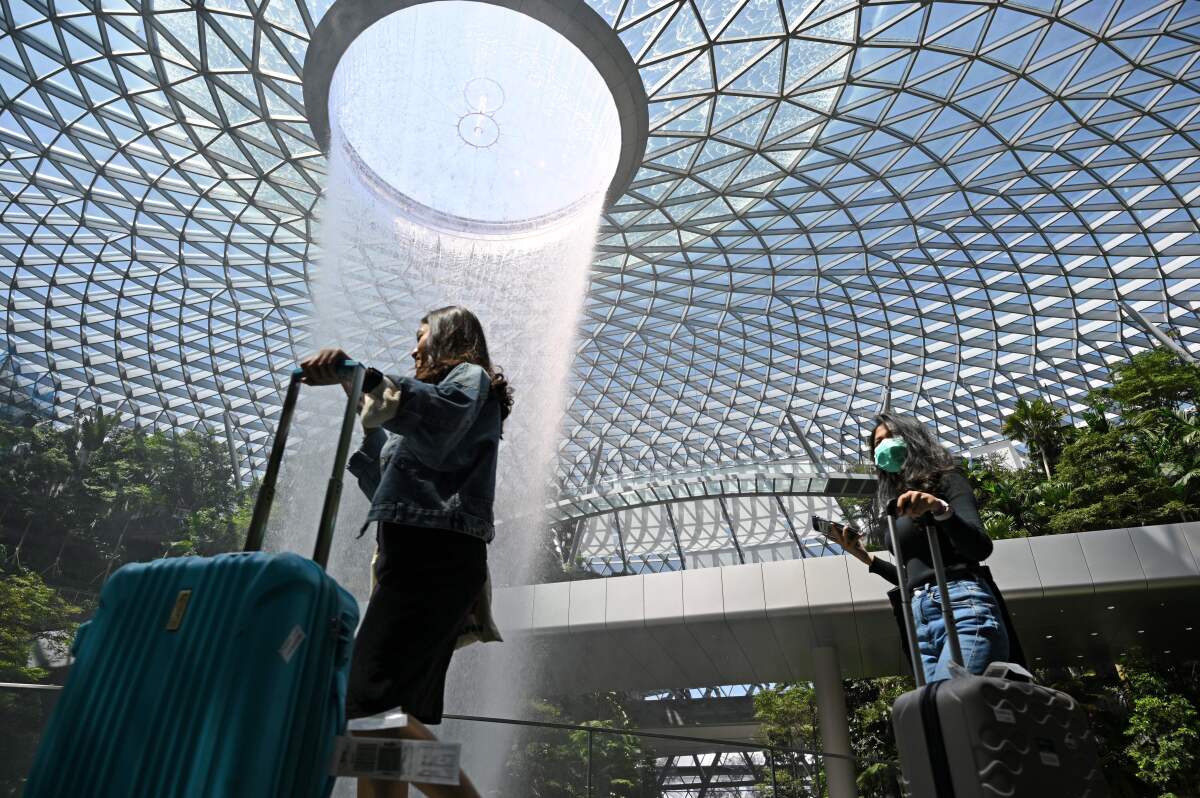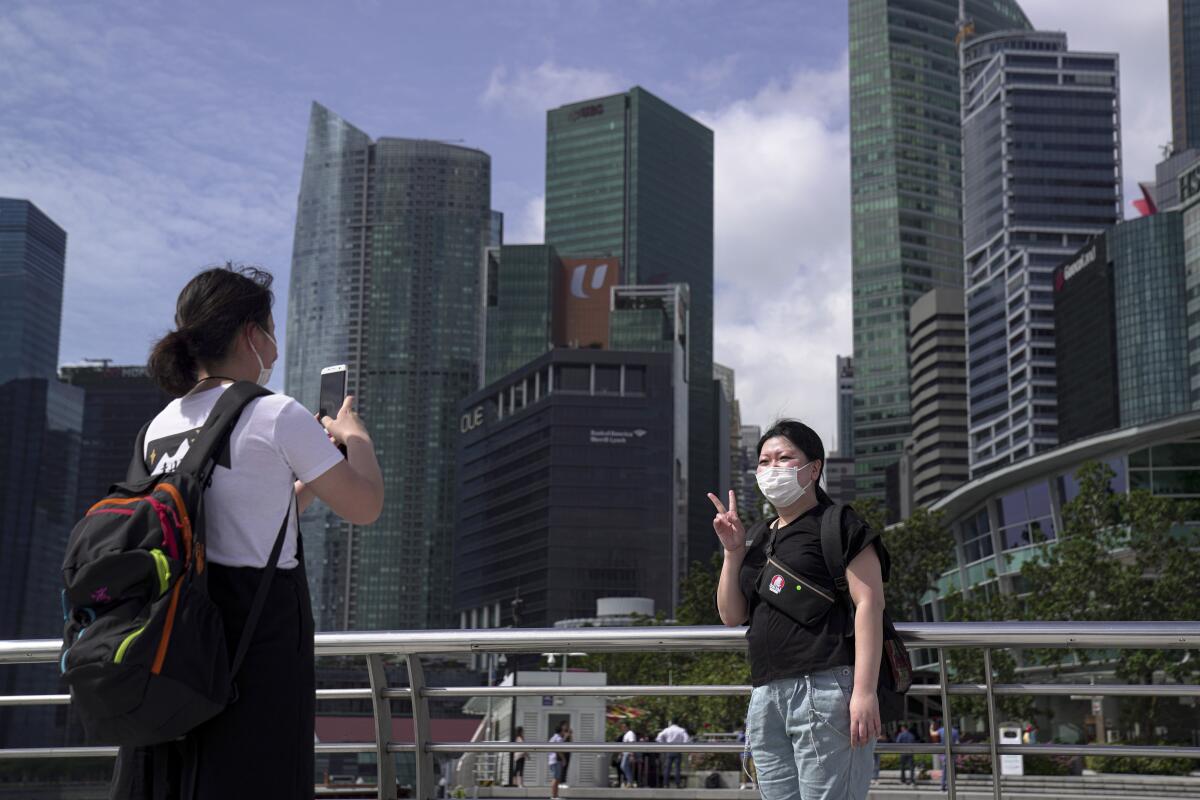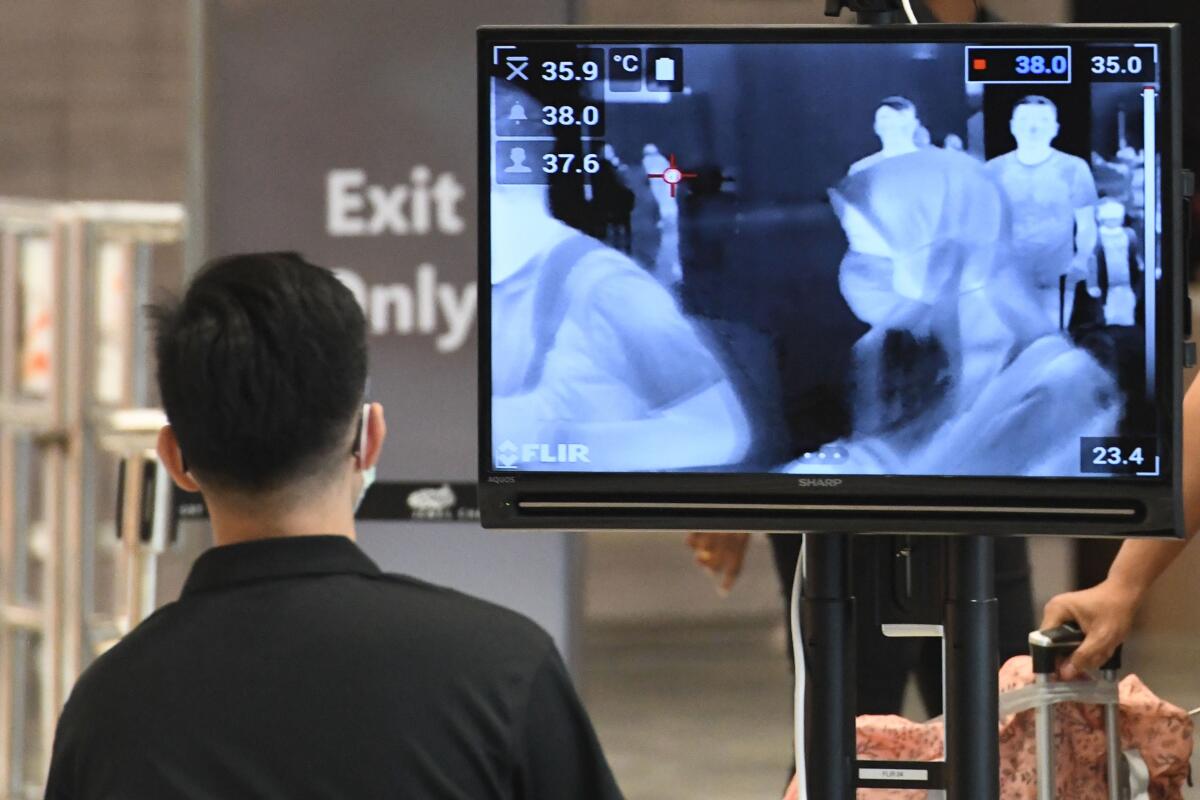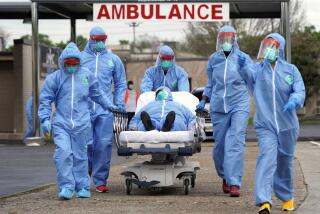How Singapore has kept the coronavirus under control

- Share via
SINGAPORE — In a fearful time of nationwide lockdowns and supermarket-aisle fights over toilet paper, Zhi Peng Lee’s website tracking the coronavirus is oddly reassuring.
Charts and maps detail patients’ ages and nationalities, length of hospitalization, where they live, their connections to one another and how the number of cases has risen and fallen with time — an elegantly simple and comprehensive source of information about the outbreak.
The catch is, the site only includes cases from Singapore — but then it’s hard to imagine it being possible anywhere else. No country has released as much detailed information about its coronavirus cases as this fastidiously run city-state.
“I’d like to launch this for the U.S.,” said Lee, the 29-year-old founder of a coding school who built his co.vid19.sg site using Singapore’s publicly available data. “The issue is the data — it’s not even close.”
To contain the disease known as COVID-19, Singapore has mobilized a system of state control that is one of the most efficient in the world. Authorities have aggressively isolated infections, tracked down and questioned their contacts, levied tough penalties for breaking quarantine or furnishing false information, and used friendly news outlets and social media to urge the public to remain vigilant while avoiding panic.
As governments from Iran to the United States come under fire for disjointed and delayed responses to worsening outbreaks, Singapore has been methodical in disclosing information about infections. The government posts daily updates with details about each new case — down to the person’s age, sex, nationality and the street where they live.
Such intrusiveness is possible, even celebrated, in Singapore, a de facto one-party state of 5.6 million people where official actions are rarely questioned publicly and the greatest civic virtue is no-nonsense competence. Of 178 people found to have been infected with the coronavirus, 96 have recovered. There have been no fatalities.
“I hope we learn lessons from Singapore,” said Dr. James Lawler, an associate professor in the infectious diseases division of the University of Nebraska Medical Center. “Whatever they are doing is working.”

A commercial hub only slightly larger than the San Fernando Valley, and run by the same party for more than half a century, Singapore’s wealth, size and authoritarian tendencies are helpful in containing an outbreak. But Singapore is challenged by its density — most residents live in high-rise apartments — and a high volume of travelers from China, 3.6 million in 2019 alone.
Officials have been preparing for an outbreak of this kind since 2003, when Severe Acute Respiratory Syndrome, or SARS, killed 33 people in Singapore, took months to contain and battered the economy. The government upgraded medical equipment and infrastructure, built more isolation wards and created systems to map and trace the spread of infections.
After the first local transmission of the new coronavirus was reported in early February, the government quickly banned school gatherings and asked businesses to call off large events. Health authorities have tested for the virus only when there appeared to be a high probability of infection, instead promoting basic hygiene.
A senior government official acknowledged this week that these steps might prove insufficient as the virus spreads worldwide, saying the government was considering “a fuller range of social distancing measures” including possible school closures and work-from-home directives.
Still, a recent study by Harvard University public health researchers estimated that Singapore was detecting three times the number of COVID-19 cases as other countries, thanks to its epidemiological surveillance and contact tracing procedures.
To locate anyone who might have been exposed to the virus, as many as 100 Singaporean police investigators help question patients and their close contacts. Anyone entering a major office building has his or her temperature taken by a thermal scanner or a guard with a digital thermometer, and is required to log their phone number and any recent travel to a virus-affected zone.

Police also have access to one of the most extensive surveillance systems in the world, with more than 86,000 closed-circuit TV cameras blanketing the island, according to the website Comparitech.
The information helped police solve an early mystery by locating a married couple that was the missing link between two otherwise unconnected clusters of coronavirus infections.
Contrast that with the U.S., where experts warn that the rapid spread of infections — now more than 1,000 nationwide — is overwhelming health officials’ ability to carry out contact tracing.
Singapore has quarantined more than 3,700 people, and those who fail to cooperate have been punished. Two international students had their visas revoked this week for providing false information about their travels. Last month, a man who left Singapore in violation of a stay-at-home order had his residency permit revoked and was barred from returning.
“The Singapore government means business,” said Benhur Lee, a Singapore native who is a microbiology professor at the Icahn School of Medicine at Mount Sinai in New York. “The reason why people listen to them is because there is trust.”
There have been blips. The government’s decision in early February to raise the outbreak alert level to orange, one level below the maximum, sparked a brief episode of panic-buying at supermarkets and drugstores.
Days later, a government minister was heard in a leaked audio recording suggesting that the country might not have a sufficient supply of masks.
Although official actions face minimal pushback, some Singaporeans wonder whether the outbreak will encourage the ruling People’s Action Party to expand state control and surveillance even further.
“During crises such as the current coronavirus epidemic, Singaporeans may be willing to accept more intrusions and erosions of their privacy,” said Donald Low, a prominent economist. “But when the crisis passes, and normalcy returns, whether they would accept the same trade-offs remains to be seen.”
P.J. Thum, an outspoken historian who has clashed with the government, said the battle against the coronavirus showed the strengths of Singapore’s policy planning, civil service, health system and high levels of urban development — not the merits of official coercion.
“Singapore’s relatively successful response to COVID-19 shows how unnecessary their authoritarianism is,” Thum said. “The state was largely transparent and communicative and people understood it was an emergency and cooperated.”
Lee, the web designer, wondered when he built his site a month ago whether officials would stop him. Sure enough, soon after it launched he got a phone call from a government ministry. But after learning that he was using only public data the officials did not ask him to take the site down.
“We have a responsible government here,” Lee said. “Through this episode, I learned they are pragmatic, not authoritarian.”
About 80% of his traffic comes from overseas. Lee, who has received dozens of emails from the U.S. asking about building a similar site, said he was watching the unfolding outbreak there with concern. Told that a father in Missouri had ignored a quarantine order to take his daughter to a school dance, he seemed baffled.
“From a Singaporean perspective, we see the U.S. as No. 1 in tech, the leader of the free world and all that,” Lee said. “So it’s surprising to see the U.S. so messed up.”
More to Read
Sign up for Essential California
The most important California stories and recommendations in your inbox every morning.
You may occasionally receive promotional content from the Los Angeles Times.












